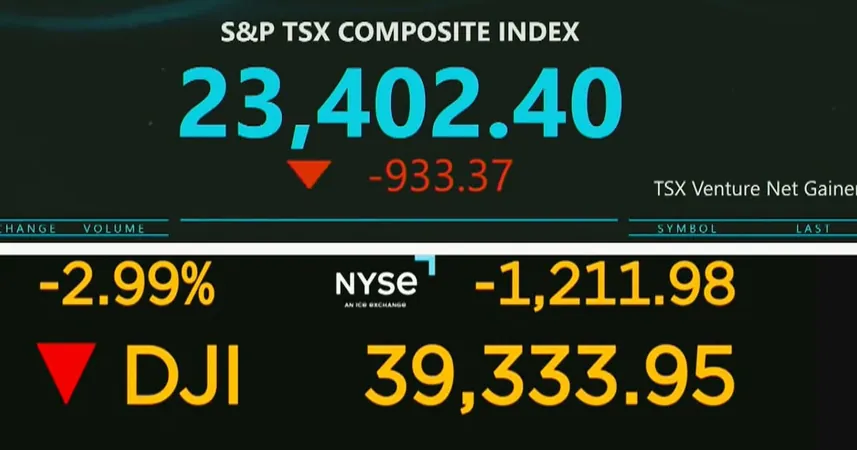
Global Stock Markets Plunge as U.S.-China Trade War Escalates: Dow Jones Dips 1,300 Points
2025-04-04
Author: Noah
Global Stock Markets Plunge: A New Trade War Era
In a shocking turn of events, stock markets around the globe faced a dramatic sell-off on Friday, with the Dow Jones Industrial Average plummeting nearly 1,300 points following China's fierce retaliation against President Trump's recently imposed tariffs. The escalating trade war has left investors in a state of panic as fears of a global recession loom large.
Despite a robust U.S. jobs report indicating that employers added more jobs than expected last month, it wasn’t enough to stave off the decline in the markets. By midday trading, the S&P 500 had fallen approximately 3.8%, after declining more than 5% earlier in the day—a stark reminder of the market's tumultuous history during the COVID-19 pandemic in 2020. The Dow itself saw a staggering drop of 1,349 points, or about 3.3%.
Repercussions Across Financial Markets
The repercussions of the trade conflict rippled through other financial markets as well. European equities were among the hardest hit, with major stock indexes losing roughly 4% of their value. Additionally, commodities such as crude oil dropped to their lowest levels since 2021, raising concerns about the impact of the trade war on economic growth fundamentals like copper prices.
China's Counteractions and the Global Economy
China's swift counteractions came in response to the U.S. imposing a 34% tariff on Chinese imports. The Chinese Commerce Ministry announced it would reciprocate with similar tariffs on all U.S. products, effective April 10. The U.S. and China, being the two largest economies, are deeply intertwined, meaning this escalating trade conflict could have severe repercussions worldwide.
Investors and Economic Outlook
While the jobs report indicated that the U.S. labor market remains resilient, it was seen as outdated by market observers, who are more focused on future implications. "The world has changed, and the economic conditions have changed," remarked Rick Rieder, chief investment officer at BlackRock. The central question now is whether this trade conflict could spiral into a global recession, which would necessitate further declines in stock prices.
The S&P 500 index has already descended around 15% from its record high set earlier this year. Many analysts suggest that the outcome largely hinges on how long Trump's tariffs persist and the responses from other nations. Some Wall Street analysts remain hopeful that the U.S. administration might lower tariffs post-negotiations, but the current outlook is grim.
Tariffs and American Consumers
Trump acknowledged that Americans might experience "some pain" as a result of the tariffs but emphasized that the long-term benefits—such as revitalizing U.S. manufacturing jobs—are essential. He compared addressing the trade war to a necessary medical operation.
Market analysts have likened the experience of investors to an operation without anesthesia, highlighting the psychological toll of the current financial landscape. Some speculate, however, that tariffs may be negotiated down more swiftly than anticipated.
Global Trade Talks and Corporate Response
Meanwhile, as the situation developed, Vietnam's deputy prime minister announced upcoming trade talks with the U.S., signifying that other nations are eager to find a resolution.
On the corporate front, companies heavily engaged with China faced significant losses. For instance, DuPont shares fell by 11.3% following the announcement of an anti-trust investigation into its Chinese subsidiary, while GE Healthcare saw a drop of 13.3% since 12.3% of its revenue originated from China last year.
Bond Market Reactions and Federal Reserve's Concerns
In the bond market, U.S. Treasury yields saw a sharp decline as concerns about the economic outlook intensified. The yield on 10-year Treasuries fell from 4.06% to 3.94%, marking a profound shift and prompting speculation about potential interest rate cuts by the Federal Reserve to ease economic pressure.
However, Fed Chair Jerome Powell warned that tariffs could elevate inflation expectations, turning a temporary price hike into a persistent inflation problem that could dampen economic recovery efforts.
Global Market Declines
As markets continue to react to these developments, Germany’s DAX dropped 4.3%, France's CAC 40 fell by 3.7%, and Japan's Nikkei 225 decreased by 2.8%, reflecting the widespread global unease regarding economic stability.
The Broader Implications of the U.S.-China Trade War
As investors brace for further volatility, the ongoing feud between two of the world’s economic powerhouses continues to send shockwaves through the global financial landscape—will the markets be able to recover, or is a recession inevitable? Stay tuned as this story develops!









 Brasil (PT)
Brasil (PT)
 Canada (EN)
Canada (EN)
 Chile (ES)
Chile (ES)
 Česko (CS)
Česko (CS)
 대한민국 (KO)
대한민국 (KO)
 España (ES)
España (ES)
 France (FR)
France (FR)
 Hong Kong (EN)
Hong Kong (EN)
 Italia (IT)
Italia (IT)
 日本 (JA)
日本 (JA)
 Magyarország (HU)
Magyarország (HU)
 Norge (NO)
Norge (NO)
 Polska (PL)
Polska (PL)
 Schweiz (DE)
Schweiz (DE)
 Singapore (EN)
Singapore (EN)
 Sverige (SV)
Sverige (SV)
 Suomi (FI)
Suomi (FI)
 Türkiye (TR)
Türkiye (TR)
 الإمارات العربية المتحدة (AR)
الإمارات العربية المتحدة (AR)